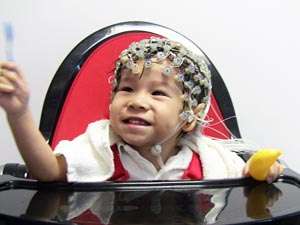A*STAR researchers assessed the attentional abilities of babies who were born to mothers with and without gestational diabetes using a “net” of sensors to measure brain activity while the infants listened to an infrequent sound and a “standard” repetitive sound. Credit: A*STAR Singapore Institute for Clinical Sciences
Babies born to mothers who develop diabetes during pregnancy – known as gestational diabetes (GDM) – are shown to have attentional deficiencies as early as 6–18 months of age, suggesting the need to reduce insulin resistance prior to pregnancy.
The study, conducted by Anne Rifkin-Graboi from the A*STAR Singapore Institute for Clinical Sciences (SICS) and Shirong Cai from the National University of Singapore, is part of a large-scale, ongoing collaborative study of mothers and children before and after birth, called 'Growing Up in Singapore Towards healthy Outcomes (GUSTO)'1.
The researchers measured brain activity in infants listening to a "standard" repetitive sound, which was expected to become familiar and therefore elicit less brain activity, interrupted by an infrequent sound. Responses differed between children born to mothers with and without GDM at 6 and 18 months of age. Notably, at 18 months, children born to mothers with GDM responded more to the "standard" sound compared to those born to mothers without GDM.
Such responses have been linked to adverse developmental outcomes such as attention deficit hyperactivity disorder (ADHD). However, Rifkin-Graboi notes that "early presentation of such differences may enable higher-risk children to be identified earlier, to allow interventions to prevent or alleviate the development of attention-related problems."
The researchers also examined memory function using behavioral tasks and found no differences between children born to mothers with and without GDM. Their subtle findings may be due to the sensitivity of techniques used to measure brain activity.
This research examined 473 children from the GUSTO study, the mothers of whom were screened and treated for GDM. "GDM was fairly well-controlled, as demonstrated by the comparable birth weights between GDM and control: GDM babies tend to be larger," says Cai.
"Our results suggest that the effect of well-controlled GDM on child neurodevelopment is subtle," says Cai. "This may encourage women with GDM to manage their condition to ensure better offspring outcomes."
The researchers are planing a follow-up study to determine whether children born to mothers with GDM develop attention-related problems later in life.
"If the association between GDM and attention deficiency persists, then pre-conception and early pregnancy prevention programs should be considered for women at risk for gestational diabetes, as should interventions for their offspring," says Rifkin-Graboi.
More information: Shirong Cai et al. The Influence of Gestational Diabetes on Neurodevelopment of Children in the First Two Years of Life: A Prospective Study, PLOS ONE (2016). DOI: 10.1371/journal.pone.0162113
Journal information: PLoS ONE




















